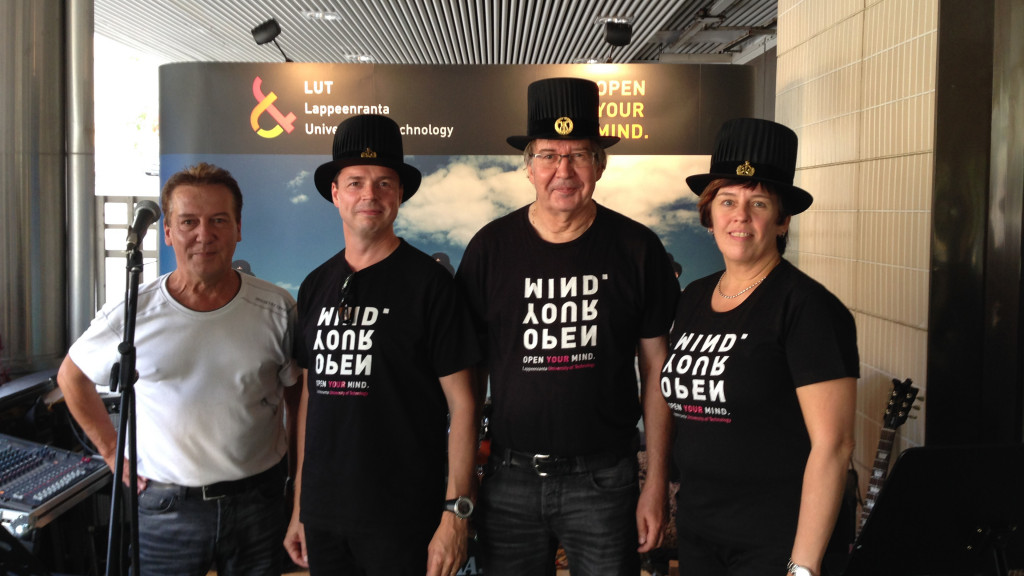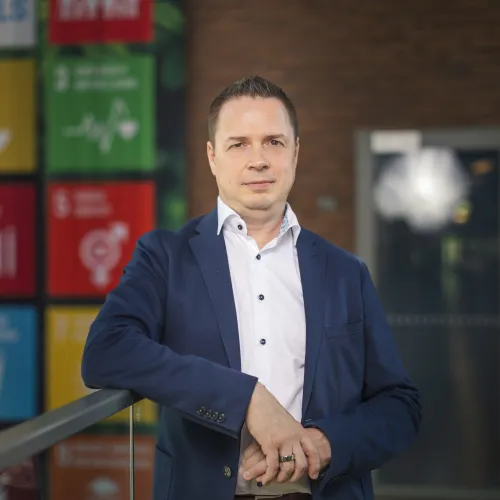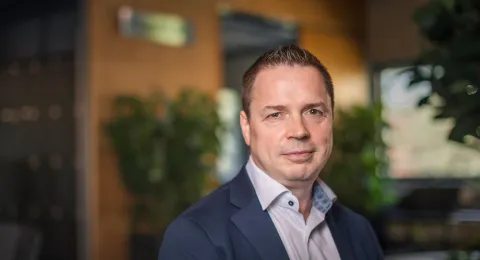LUT Business School celebrated its 30th anniversary in 2021. To mark the occasion, we published a series of interviews with the school's current and former employees and alumni. This article was first published in August 2021.
"All you bother doing is chew gum."
The words of his guitar instructor struck a chord with the young Sami Saarenketo. For the following lesson, Sami decided to show him and learned all of the songs he was given as homework.
The Boiler Room Project, Lizard King, and Family & Friends are some of the bands in which Saarenketo played and sung vocals. Saarenketo first held a guitar when he was eight years old and has been in a number of bands since the age of 13. He first sang backup but then found himself as a lead vocalist when, to quote his own words, there was no one else to do the job. His band members were childhood friends – some even lived in the same apartment building.
"We were serious about band practice and we had great ambitions. We were definitely working towards a goal. Radio Mafia, a popular station at the time, played a couple of our demos, which was a great accomplishment for us. We even got good feedback on our songs. In addition to writing our own songs, we played rock music from the 60s and 70s – the decades that influenced me most musically," Saarenketo says.
Saarenketo's most exotic performance was at the Helsinki central prison in 1988. He has also played renowned venues in Finland, such Pakkahuone in the city of Tampere, where he took the stage with a group of LUT professors in the music event "Professors Rock" in 2014. Another performance he fondly looks back on is his All Stars band at LUT University's 50th anniversary party; LUT's Rector Juha-Matti Saksa even joined in on their encore.
Saksa recalls an IAMOT conference in Washington, D.C., in 2004. The rest of the gang decided to head for a beer after the long flight there, but Saarenketo was suddenly nowhere to be found. IAMOT stands for International Association for Management of Technology.
"We found Sami at a guitar store where he was testing the more expensive models. Music really is a lifeline for Saarenketo," Saksa concludes.
Saarenketo's musical affinity quickly becomes apparent to new employees at LUT Business School. For example, Saarenketo's latest Christmas greeting to his staff was in the form of a YouTube music video. He had chosen John Lennon's and Yoko Ono's song Happy Xmas (War Is Over).
"Music has always been an outlet for me. It has also been a way to get to know people. LUT has surprisingly many musical professors, and I have gotten to know them more profoundly than I would have without music as the common denominator," Saarenketo explains.
Why, then, didn't Saarenketo become one of the shining stars of the Finnish music scene?
"After high school, I did my compulsory military service and cut my long locks. It kind of ended there."
In other words, real life got in the way.
"The music business is tough. I guess we all thought that we needed another set of skills to fall back on."
No need to leave the old hometown
In 1990, women were wearing huge shoulder pads and Madonna's Vogue and the Finnish pop star Ressu Redford's Älä mee were topping the Finnish charts. That was also the year Sami Saarenketo graduated from high school and decided that he needed to get out of his hometown of Nastola as fast as he could.
Nastola was a municipality in southern Finland, which has since merged with the larger city of Lahti. In the olden days, the rivalry between Nastola and Lahti was fierce. Legend has it that you risked getting punched in the face in Nastola if you admitted to being from Lahti. This may be a tall tale and the admittedly inhospitable attitudes have later shifted, but locals still take pride in their roots.
Saarenketo was the type of boy that mom never had to worry about.
Saarenketo's father was a maintenance worker for the municipality and his mother worked for the textile company Luhta. Luhta was also the place Saarenketo worked summers – "stacking winter coats", as he says. Nevertheless, he quickly came to the conclusion that moving coats around was not really his thing.
"I have a copy of the Finnish directory of professors in my bookshelf, and it weighs a ton. It shows you that there are families of professors in Finland: the choice of profession is passed on from generation to generation.
It's like working as a doctor or entrepreneur – it often runs in the family. Childhood role models may sway you towards similar choices but may also push you in the opposite direction."
Business studies appealed to Saarenketo when he was approaching his twenties, and after high school, he went to a business college in Lahti. One year, Saarenketo and a friend of his ended up spending the national May Day holiday in Lappeenranta, where university students take the festivities to a whole other level. Saarenketo was impressed by everything that went on and decided to apply to LUT.
In 1999, Saarenketo had a Master's diploma in hand and a newly-wed bride on his arm. The couple was contemplating a move to Germany, where they had already spent a year in Stuttgart. The plans changed, however, as they decided to stay in Finland with their five-week-old daughter, Sofia.
Professor Kirsimarja Blomqvist, who hired Saarenketo at LUT, explains what happened next:
"I recruited Sami and Professor Olli Kuivalainen at the turn of the millennium when I was setting up a multidisciplinary research center, the Telecom Business Research Center (TBRC), at LUT. Sami had been working for a telecom operator, and I was looking for people with expertise in both business and technology. Sami was rather shy at the beginning but came out of his shell as time passed," says Blomqvist, Professor of Knowledge Management at LUT Business School.
At the time, telecommunications operators only transmitted phone calls. An example of TBRC's research topics was how the operators could develop value-added services with growth companies.
Only a small share of TBRC's budget came from the university. The center collaborated extensively with both small and large ICT companies. The team started out with a few employees but kept growing with the phone carrier Sonera as its largest investor.
"TBRC was a unique place to work at the time. It had its own culture and an inspiring atmosphere. It produced good results. Sami and Olli later wrote their doctoral dissertations on so-called born global enterprises based on data from TBRC's very first research project," Blomqvist reminisces.
During those years, Saarenketo's appetite for academic research grew.
"That kind of ambition didn't come from my parents, so I guess it's innate. I may not have had academic role models in my childhood home, but I got mentors from my work community," Saarenketo analyzes.
Saarenketo especially mentions the professional support provided by Professor Toivo Äijö and the former dean of LUT Business School, Kalevi Kyläheiko, who were the supervisors of his doctoral dissertation. It was as if they had a non-verbal agreement on the exchange of know-how. Saarenketo's sparring partners also included Jaana Sandström, one of LUT's current vice rectors, and Kirsimarja Blomqvist.
Saarenketo never left his old childhood neighborhood far behind: in 2016, Nastola merged with the city of Lahti, where LUT's other campus is located.
"You no longer have to leave Lahti to get a university education. LUT provides that opportunity," Saarenketo points out.
Go big or go home
Go big or go home is one of Saarenketo's favorite sayings.
Whenever someone asks him to do something, Saarenketo usually says yes. That is how he claims to have ended up as the dean of LUT Business School.
Saarenketo was the vice dean when Jaana Sandström was the dean.
"Someone once said that a vice dean's primary duty is to make sure the dean shows up at work. It also enabled me to see what a dean does, and the transition to dean was therefore natural for me."
Saarenketo says he never actively pursued his current or any other leadership position.
"I have worked in different administrative positions for nearly 15 years, and I apparently have a natural inclination for jobs like this. I enjoy my work."
Saarenketo says he used to be a hasty decision-maker but has learned to take a time-out before deciding one way or the other.
"I sleep on it.
Nevertheless, I don't want to put off making decisions. As a dean, I need to make many of them a day. It helps to know that LUT's top administration trusts me. Or as our rector, Juha-Matti Saksa, says, I have a license to operate."
Saarenketo has, in fact, never been the type of person to put off doing things. He came to understand how short life is at a young age: his father died when Sami was only twenty. Moreover, his mother succumbed to cancer only recently.
Saarenketo's outlook on the world has also been molded by her older daughter Sofia's special needs. A couple of years ago, she suffered a stroke and lost her ability to speak and walk for a while.
"Sofia recovered well but not fully. Some people might feel sorry for her, but Sofia is actually quite content. She's doing fine," Saarenketo says.
Years after Sofia, the family welcomed another daughter, Helmi. She gets top grades at school and is, according to her father, a politically aware feminist.
"With Sofia, I go to concerts, and with Helmi, I talk about classic English literature."

Year 2014: 4ROCK-band, Lauri 'Late' Valjakka, Sami Saarenketo, Henry Lindell and Pia Heilmann.
A dean's mission is to serve
Of Saarenketo's predecessors, Kalevi Kyläheiko is considered the one who put LUT Business School on the map and whose spirit you can still sense on campus. Jaana Sandström, on the other hand, reformed the school's program portfolio and was the catalyst for obtaining international quality labels or accreditations for the school.
Saarenketo admits that he feels pressure to make his mark as a dean and leave a legacy.
"Nonetheless, you're never done with quality development in research. We also have a lot of ground to cover in international affairs, and education development is a long-term thing. We are actively seeking new accreditations and follow student feedback closely. For me, student feedback is an important indicator of our success."
Saarenketo says a dean shoulders 360 degrees of responsibility. However, he points out that a dean does nothing alone. During Saarenketo's term, LUT Business School established six teams, each with its own leader.
"A dean's mission is to serve. A dean provides his troops with cover fire from the sidelines."
It's not a one-man war, but according to Paavo Ritala, Professor at LUT Business School, the dean is still instrumental in creating the working conditions in the school.
He describes Sami's leadership style as modern: giving experts the opportunities and space they need to conduct top research, to teach, and to influence.
"In addition, Sami has an excellent grasp of the international competition between business schools. LUT Business School has been making its way towards the international top with Sami as its dean, continuing his predecessors' excellent work," Ritala says.
LUT's Rector Juha-Matti Saksa feels that Saarenketo is first and foremost a spirit raiser.
"You could by no means call him Mr. Excel," Saksa jests, referring to Microsoft's world-famous spreadsheet program.
Junior grows up
LUT Business School celebrates its 30th anniversary in 2021. It employs over 100 people, and 266 students graduated from the school last year. The number is higher than ever before in the school's history.
"Compared to the 110-year-old business school of Aalto University, we still have growing up to do, but we are getting results.
The quarter for brand-building is 25 years. We're not done yet, but we've taken huge leaps forward," Saarenketo ponders.
Times Higher Education (THE) ranked LUT Business School (former name LUT School of Business and Management) among the top 200 business schools in 2020 (Top 150 in 2024). In early 2021, the international marketing program renewed its five-year EFMD quality label. Next, the school will be pursuing a higher-profile AACSB accreditation.
Saarenketo mentions that more and more business schools have applied for the same quality labels or are in the process of doing so, which means their degree programs are starting to resemble each other.
According to Saarenketo, the strength of LUT Business School lies in the fact that it is one-of-a-kind and proactive. For example, it was the first in Finland to establish a business analytics program. The University of Oulu and Aalto University followed in its footsteps later on.
Saarenketo describes the school's students as future-oriented and market-driven. Responsible and sustainable business has been on the school's agenda for a long time.
"We are a school of business in a university of technology, but our position is well-established and widely recognized. It is essential that we stay relevant also in the future."
Graduates of the school have rated LUT's atmosphere as the best in Finland for a number of years. Saarenketo is a bit concerned about how the so-called Skinnarila spirit, named after LUT University's Skinnarila campus, can be upheld during the COVID-19 pandemic and distance studies. He feels the school's unique atmosphere is a good way to stand out from the other business schools in Finland.
"LUT challenges the larger higher education institutions in the Helsinki metropolitan area, and its business school is compact and offers a sense of community. We are ready to make agile changes. Our culture is experimental and leaves room for errors."
There has been talk about global education reforms, such as a Netflix-type menu containing all business school courses available in the world, but Saarenketo still believes in age-old university education. University rankings, where LUT has fared well, are a by-product on the path towards greater international influence.
"We solve wicked problems that are critical for our future. It is important that LUT Business School keeps up with societal and global changes – has its finger on the pulse. We can do it because we have the best possible staff and students."
Counting his years as a student, Saarenketo has graced LUT with his presence for 26 years – the past five as a dean. How long can one dean reign?
Saarenketo says he is not serving a life sentence. He is still a professor of international marketing and can return to research and education work if he so wishes. Be that as it may, he is in no hurry to pass the baton on to the next dean.
"I am prepared to do this as long as I have the drive and I retain the trust of the staff and management."
Further reading:
Get to know us
- ”It’s been a wild ride,” says LUT University’s education reformer, Vice Rector Jaana Sandström
- This is the man who took the LUT School of Business and Management to the world – Kalevi Kyläheiko is a character everyone remembers
Check out this alumna story
Did you know this?
Sami Saarenketo
- Born in Nastola, Lahti. Resides in Lappeenranta.
- Family: wife and two daughters, ages 15 and 22.
- Dean of LUT Business School since June 2016.
- Doctoral degree (international marketing) from LUT, 2002.
- Master of Sciences (Economics and Business Administration), LUT, 1999.
- Graduated from a business college in Lahti after high school.
- Started as a junior researcher at LUT in 1999.
- Professor of international marketing since 2004.
- Head of the Department of Management and International Business, 2007–2009.
- Vice dean of LUT Business School, 2009–2014.
- Visiting professor at Mälardalen University, Sweden, since 2016.
- Visiting professor at Trondheim Business School, Norway, 2014–2015.
- Visiting researcher at Stanford University, USA, 2012.
- Researcher and project manager at TBRC, 1999–2002.
- Chair of the board of OP Etelä-Karjala.
- Is a morning person and goes jogging or to the gym before work.









